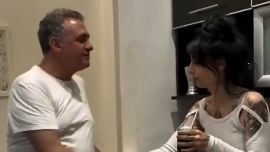Argentina, like so many times before, is experiencing a complex moment.
The 2019 presidential election yielded a change of administration, returning former head of state Cristina Fernandez de Kirchner to the corridors of power as vice-president. Incoming leader Alberto Fernandez has promised to legalise abortion in the Pope’s homeland, yet his more pressing challenge is leading Argentina out of two-year recession – inflation is higher than it's been since 1991, poverty is on the rise and the government urgently needs to restructure a creaking debt burden.
Argentina’s reputation for crisis and contradiction frequently complicates understanding of the country, and questions about the present and future of the country are often dismissed as all but unknowable.
Nevertheless, these seemingly unanswerable questions – and more – will be addressed this Tuesday, March 10, at the BBC’s World Questions interactive forum in Buenos Aires.
The free event, organised by the British public broadcaster and the British Council, will take place at Teatro Picadero in front of a live audience, and members will have the chance to voice their concerns to a panel of leading experts and thinkers.
The interactive forum will be hosted by BBC’s Jonny Dymond, who told the Times about the event, his experience working as a BBC foreign and royal correspondent, and Argentina at large.
Could you expand a little bit about what the World Questions forum is?
The format is relatively simple, we have a panel of four people. [The audience] writes down questions on cards that we give them, and then we choose which questions to put to the panel, based on how many we get on each topic. The panel gives an answer, and we then try to draw the audience into the discussion. It’s broadcast on the BBC World Service and available on the BBC website as well. We generally record Tuesday or Wednesday night, and it generally goes out the following Saturday.
We’ve done about 40 different cities [to date]. It’s often capitals, but we try and get away from capitals as well because you get a different kind of audience when you leave the capital. It’s been all around the world. It’s a format that the BBC has used in the UK for quite a while, and we decided to take it international, and it’s gone pretty well. We’ve had people say, “Why does it take the BBC to come here for us to do this?” or “Why don’t we have these kinds of debates in parliament?”
It’s an eye-opener for a lot of people to have that kind of mix between a town-hall format and relatively high-level panel.
Could you talk a bit about why it’s important to broadcast the forum worldwide? Why take this event around the world?
What is astonishing about it is how many commonalities there are around the world, how many questions we get from people that are relevant to Lagos and Helsinki and Bogotá. I didn’t expect it, to be entirely honest. [...] I understand that phrase, “all politics is local,” but a lot of politics is surprisingly global as well, and the answers that we get on these big topics are clearly of interest around the world.
[The show] is grounded in the country that we’re in, but I genuinely think it’s of interest all around the world.
With that in mind, what brings the forum to Argentina, and what made the BBC choose this particular moment to come to Argentina?
Well, it’s tempting to say it’s always an interesting time in Argentina. It’s very difficult to ignore Argentina. Every country has its attractions – for Argentina, obviously, it’s astonishing history, its governmental challenges, its economic crisis that seems to roll on and on, but also the depth of its culture.
We try not to just do economics and politics. We very often have questions about culture and gender. Argentina just touches on a lot of those really interesting issues. Yes, about government, populism, political comebacks, economic mismanagement. But also about lots of other really interesting issues like the identity of a country, how much that identity is reflected in its culture, how other people see it, how it sees itself. So it’s not really “Why come to Argentina” but “Why not?”
How have you found the process of getting up to speed on Argentina’s situation?
It’s surprisingly hard, actually. And that’s partly because South America is very often a bit of a black hole, I think, for people from Western Europe. I think [the UK] probably under covers it in our international news, a bit.
The other [challenge] is, amongst the getting up to speed, the pace of change that there’s been for so long now. To understand causes of the crises, how its been dealt with or not, and the challenges that that’s brought on the ground as well. And another thing is its astonishing history, its constantly changing sense of identity – I love countries which have to grapple with themselves over the decades. I was a Europe correspondent for a long time, and going to visit places like Germany, and later Poland, was fascinating because these are countries that are lifting their identity up to the light and working out what they are.
Argentina feels like that. So it’s a big challenge, and there’s more work to do. But it’s a fascinating country and a tough one.
Shifting focus to the UK, what is it like to be a royal correspondent? What is the access to the royal family like? How has it changed?
I think it’s fair to say, the royal correspondent is one of the strangest jobs in journalism. Part of that is because it is such a heavily mediated job, in that the information that we get is controlled, pretty heavily by the palaces. [...]
It's been incredibly busy and at times very interesting. The really big difference – and this really took me aback – is that when I was foreign [correspondent], I thought I did a job that everyone was completely fascinated by. Because it’s so kind of rollicking, and you’re living in a different country, and you generally live a series of very exciting cliches, or I did. And literally nobody cared about anything that I’d seen or done! I’d say “I just got back from Baghdad,” and nobody would care, or “I just got back from Gaza, there’s a terrible war.” Nobody cared.
Now everybody cares about my job. Even people who will start sentences like “I don’t care at all about the royal family, but is it true that..” It’s bizarre. So I’ve gone from this job that I thought was amazing and brilliant that nobody seemed to care about, to this strange sort of mediated job that it seems everybody cares about.
Going off of what you said about unfair coverage, and given everything that’s happened in the past few months, do you think that the coverage of Meghan Markle has been fair?
That’s a good question. No, not really, I guess. And look, I really don’t want to go down the path of criticising my colleagues, because generally I think the royal correspondents themselves are good journalists. They don’t print lies.
I think what did happen, was that quite a lot of the commentators and columnists realised that having a go at Meghan was controversial and clickable. That, combined with the stuff on social media, I thought, was grotesquely unfair, and sexist, and, at times, racist. It was a very surprising tone. And the whole thing, you know, Harry wore the uniform, and Meghan was a young mother, living in another country, doing another job, with another family, and there was an awful lot of bile poured on them towards the end. It didn’t feel like a great national moment.
* The BBC World Questions interactive forum event will take place on Tuesday March 10, 2020, at 6:30pm at the Teatro Picadero in Buenos Aires City. The resulting show will be transmitted in English on BBC World Service on Saturday, March 14 at 6pm and can be accessed via the BBC’s website. Admission for the event is free, but online registration is required, and audience members are expected to arrive on time. To register, visit: https://argentina.britishcouncil.org/en/events/bbc-world-questions-buenos-aires.



















Comments